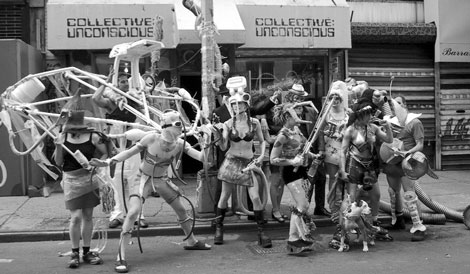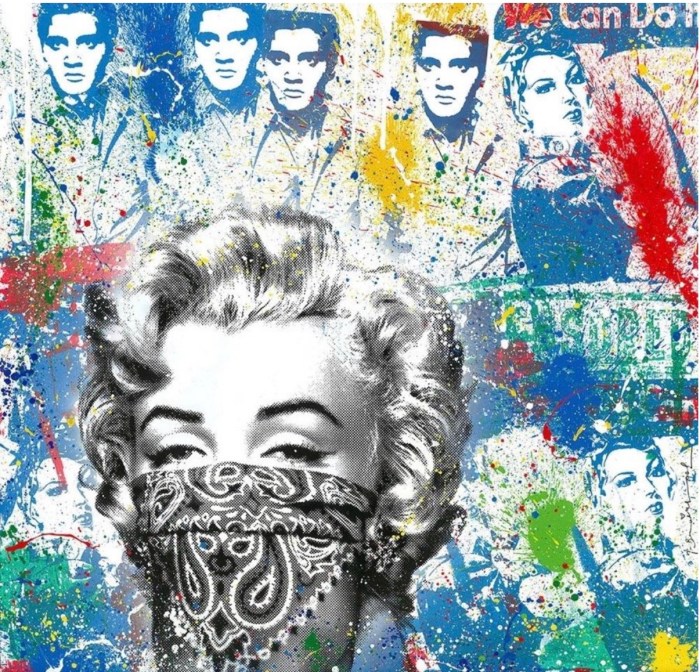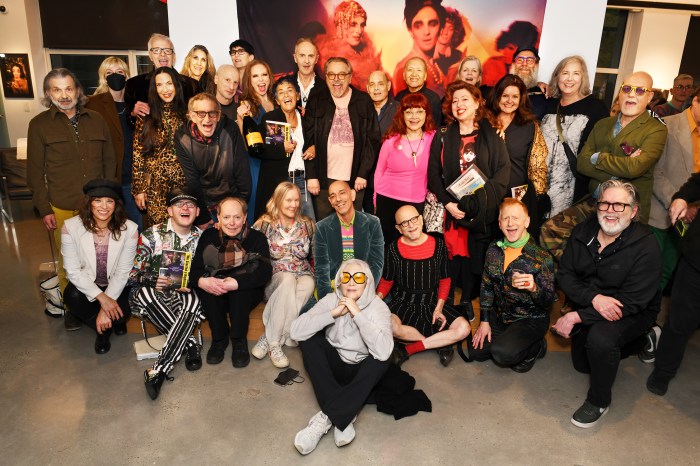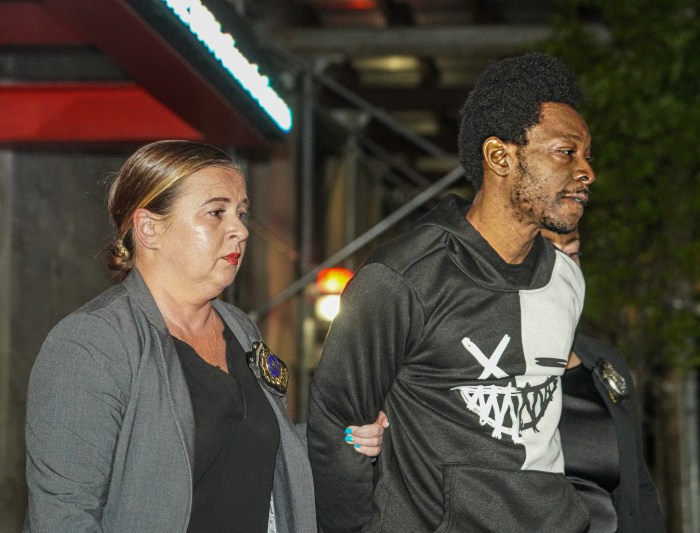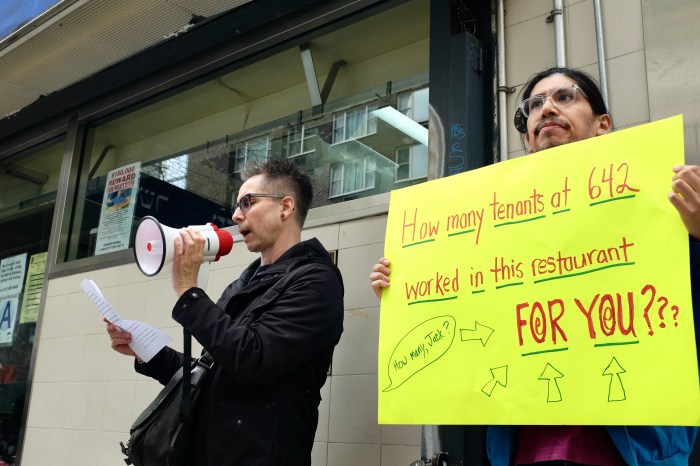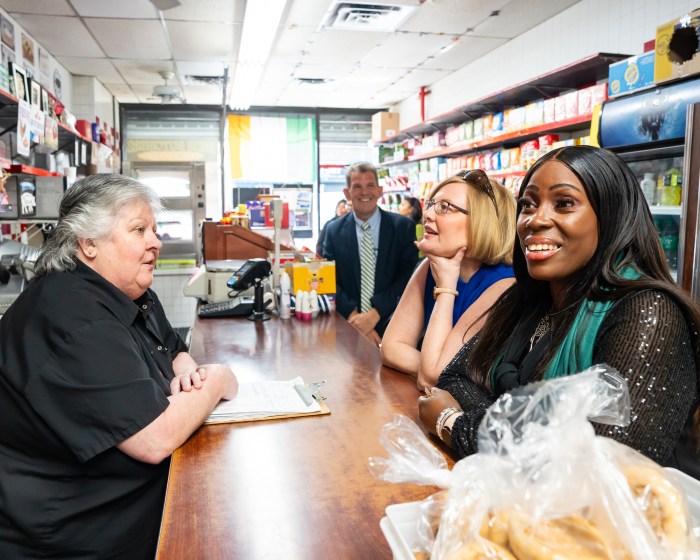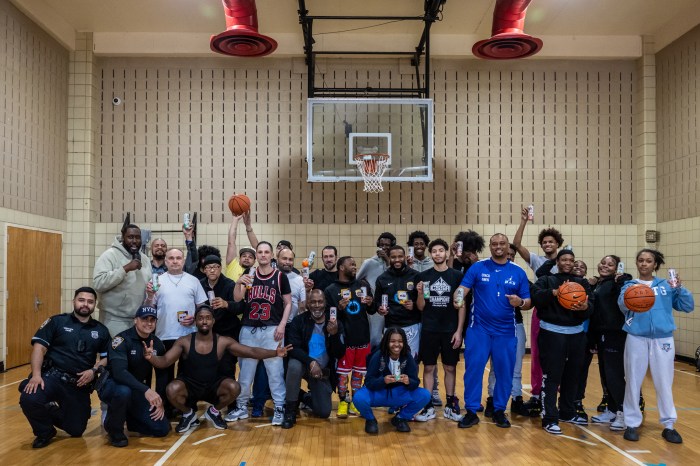By David Kelsey
“This is a tough year for the Lower East Side,” said Michael Medvin, winner of Reverend Jen’s fifth Mr. Lower East Side Pageant.
The pageant’s annual venue is Collective Unconscious on Ludlow St., where Reverend Jen has also been running her open-mike event, “The Anti-Slam,” for eight years.
But both events may soon have to find a new home. Ludlow St.’s last surviving theater, Collective Unconscious is scheduled to close at the end of July. The one-story building at 145-147 Ludlow St. is being sold, and is expected to be demolished and replaced by an eight-to-10-story luxury apartment building.
The Collective is owned and operated by 15 artists, and has proven a fertile ground for artists who are starting out. “You can probably come to us, and you can probably afford it,” boasts Collective Unconscious member Gilad Rosner.
A night at C.U. requires only a $200 guarantee, with profits split evenly after that. Because Rosner and Patrick Daniels, one of Collective’s founders, don’t have the time to investigate each show in depth, “everyone gets a chance to suck,” as Rosner puts it. It is this low-cost opportunity for new, risk-seeking performances at Collective that generates, as Rosner says, “a lot of social capital.”
The open mikes at Collective Unconscious have been valuable for additional reasons as well. With the support of Faceboy, a.k.a. Frank Hull, Reverend Jen began her Anti-Slam “to counteract the popularity of poetry slams,” she says. “Something judgment-free for people just starting out. An incubator.” Both Faceboy and Reverend Jen are vigilant in their push for as close to a zero-tolerance policy as possible from heckling. “It’s the kind of space that someone who has never performed should be able to go to and not be afraid,” says Reverend Jen. It’s also $3 to perform, as opposed to the usual $5 charged at most open mikes.
Eric Kirschberger, last year’s Mr. Lower East Side, has appeared on both Comedy Central and HBO, and is able to support himself from his standup, supplemented by commercials. But he continues to see value from performing at the Collective Unconscious open mikes. “It’s a venue where I am totally free to try something different in a supportive environment,” he says. “And it’s like family. A very crazy, dysfunctional family.”
Collective Unconscious has produced quite successful works as well, receiving two Drama Desk Awards in 2000 for Charlie Victor Romeo, based on six major real-life airline emergencies. The play was also filmed by the U.S. Air Force to be used as a training video for pilots, and is referenced by West Point as well for cadets in training.
Reverend Jen — who is known to sport elf ears — personally designed much of the Collec-tive, and remembers how far away from being an “art house” Collective was at its start. “They used shower curtains for curtains,” she recalls. “It’s really indicative of the nastiness, of how foul Collective was at the beginning.”
Ludlow has changed dramatically since the Beastie Boys immortalized Paul’s Boutique back in 1989. Few commercial tenants from that era survived, nor do the new shops have much in common with the culture of the neighborhood. Certainly not the new crepe shop, for example.
The building at 145-147 Ludlow is one floor plus a basement, and houses two commercial tenants: Collective Unconscious and Barramundi, a bar/club. Anya Chowaniec, owner of Barramundi, is philosophical. She can’t help but see how the neighborhood scene is changing. “It’s such a circus,” she says. “Obviously our days are numbered.”
Indeed they are. The building is being sold, and after Barramundi’s lease expires in August, the building is expected to be demolished. While the Department of Buildings registers the building, built in 1873, as owned by the Koenigsbergs, a deal is reputedly “in the works,” according to a broker at Misrahi Realty, and a luxury building will take its place. Barramundi was not offered a new lease.
Once pitched as “New York’s Bargain District,” the commercial area of Orchard St. would have seemed to face an imminent threat from the Kmarts, Gaps and other large stores that have opened a presence in the city.
However, during the late ’90s, the Lower East Side’s Business Improvement District, under the leadership of Matt Bauer, helped guide the Lower East Side’s metamorphosis from a bargain district to a boutique shopping area. Under Andrew Flamm, the BID’s current executive director, the Lower East Side continues to maintain its historic independent character and culture, devoid of corporate presence. The major change is the flourishing of restaurants and bars encroaching south from Houston St.
Robert Prichard, the creator of Surf Reality, a major independent theater, credits the BID for placing Surf Reality on the M.T.A. neighborhood subway map. Surf Reality was where Faceboy ran his phenomenally successful open mike. This past April, however, after his landlord offered him a new lease with an $8,000 a month rent, Prichard had to shut down Surf Reality.
The BID does not include Ludlow St., though. Meanwhile, Misrahi Realty has emerged as a development force. Sion Misrahi began his operations 10 years ago in a very different Lower East Side, and has grown to be a major impetus of change and gentrification as the neighborhood’s real estate values have rocketed. “It’s like he won the lottery. I can’t fault him for that,” said Barramundi’s Chowaniec.
Although Reverend Jen and Faceboy frequently collaborate, they will very likely end up in separate spaces. Janice Erlbaum, who handles the administrative needs for Faceboy, was looking for a new space for him; and Reverend Jen was planning to move to the Ding Dong Lounge, a large dive bar in Manhattan Valley, and a shocking distance from the Lower East Side. But then a delay of the theater’s eviction until the summer was agreed upon, since it is useless to the landlord to evict the Collective when the bar will remain until the end of its lease, blocking demolition until then. The Collective now is attempting to raise money for a new space, and has set its goal at $150,000.
“First comes vice, then comes commerce,” shrugged Collective member Irving Gregory, a student of Samuel R. Delany’s book, “Times Square Red Times Square Blue,” about the blue-light district past and recent redevelopment of Times Sq.
Reverend Jen, however, ponders a more proactive approach. “The Lower East Side is being strip-malled and turned into a bedroom community!” she protests. “I’m personally going to combat it with a de-gentrification program.”
There was a three-day period when the building was once used as a brothel, according to Gregory.
“If we want to pay our rent, we would have to turn back into a brothel.” Reverend Jen says, rejecting the idea as ridiculous, since, “I imagine that sort of thing could be time-consuming. I want to focus on my art.”
Councilmember Alan Gerson, whose district includes part of the Lower East Side as well as Tribeca, is attempting to secure a place for the Collective in Tribeca that is “either directly subsidized or set aside.” Gerson claims this is in the interest of the city, since, he says, it is the less-prominent artists that “keep the freshness and avant-garde nature of the Downtown scene exciting, vibrant and culturally significant.”
Gerson feels confident others in city government will see it his way. But if not?
“We’ll agitate for it,” promised Gerson.



